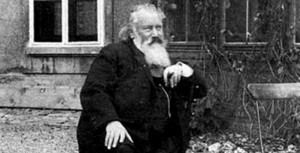 “Minors of the Majors” invites you to discover compositions by the great classical composers that for one reason or another have not reached the musical mainstream. Please enjoy, and keep listening!
“Minors of the Majors” invites you to discover compositions by the great classical composers that for one reason or another have not reached the musical mainstream. Please enjoy, and keep listening!
When Johannes Brahms published his folk song adaptations in seven booklets in 1894 he said, “It is the first time that I regard with tenderness that, which I have produced.” Yet surprisingly, he did not give these pieces a dedicated opus number, as he didn’t regard himself as the author of these miniatures for voice and piano. Brahms worked for years on these 49 German folk song settings, regarding the song as a structure subject to musical rules. For Brahms, these settings emerge from a tightly constructed contrapuntal framework of melody and bass, and not as literary works to be interpreted with the aid of music. This conception of song was in contrast to the elaborate literary compositions in the manner of Liszt or Wolf, who according to Brahms, “were sailing in the wrong direction.” For the most part, Brahms left the melodies intact, yet his harmonic interpretations, rhythmic pictorials and motific polyphony keeps the border between folk and serious music essentially fluid. This fluidity appears most prominently in the song “In stiller Nacht” (During the quiet night). Brahms takes the original folk melody and uses it for the first couple of measures before composing the remainder of the melody himself. The Brahms biographer Karl Geiringer wrote, “How magnificently the melody is contained in the very spirit of the song! Who could detect the work of the restorer, and who could fail to recognize that this stylistically faithful continuation of an older melody was possible only after the complete absorption of the spirit of the folk song.” Upon completing the last song in this collection Brahms wrote to his publisher, “Did you realize that as a composer I definitely have said farewell? The last of the folk songs and the same one in my Opus 1 are the serpent that bites its tail and says nicely, symbolically, that the story is over. If I should compose anything more for fun, I shall take care that publishers will not be tempted.”
Johannes Brahms: Deutsche Volkslieder, (Excerpts)
You May Also Like
- Minors of the Majors
Manuel de Falla: Allegro de Concierto Manuel de Falla’s small oeuvre includes symphonic, instrumental, vocal and theatrical music. - Minors of the Majors
Richard Strauss: Macbeth, Op. 23 Richard Strauss’s monumental tone poems are the central musical expressions of the Austro-German tradition at the turn of the century. - Minors of the Majors
Gustav Holst: Ave Maria Primarily known for his vastly influential orchestral compositions, Gustav Holst (1874-1934) nevertheless composed a wide variety of moving choral works. - Minors of the Majors
Anton Bruckner: Abendzauber (Evening magic) Unlike his compatriot Gustav Mahler, Anton Bruckner wrote a considerable quantity of choral music.
More Anecdotes
- Bach Babies in Music
Regina Susanna Bach (1742-1809) Learn about Bach's youngest surviving child - Bach Babies in Music
Johanna Carolina Bach (1737-81) Discover how family and crisis intersected in Bach's world - Bach Babies in Music
Johann Christian Bach (1735-1782) From Soho to the royal court: Johann Christian Bach's London success story - A Tour of Boston, 1924
Vernon Duke’s Homage to Boston Listen to pianist Scott Dunn bring this musical postcard to life
